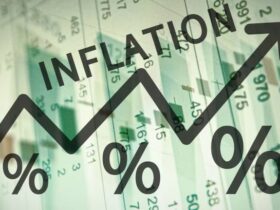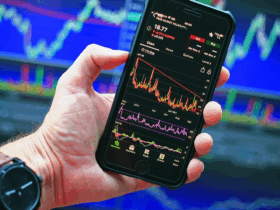Search volume for “e-commerce” has declined post-pandemic, while sales are steadily rising. Businesses have adjusted their marketing and sales strategies accordingly.
Investment decisions often follow cyclical patterns shaped by commodity price booms and economic cycles, yet rising trade barriers and policy uncertainties could hinder business investment plans.
Economic Growth
Business investment is one of the cornerstones of economic expansion and serves as an indicator of long-term productive capacity in an economy. Companies invest to grow their businesses, expand current operations or enhance existing products; the pace of this investment may fluctuate according to commodity price booms, economic cycles or government policies.
Technology companies are investing billions into building data centers that will meet the rising demand for massive computing power, both to feed AI models that require immense amounts of data as well as supporting emerging applications such as autonomous driving or large language modeling.
Growth of emerging market developing economies (EMDEs) is expected to slow by 2025 due to rising trade barriers and policy uncertainty. Russia could help soften this impact while further relaxing of trade barriers or faster advances in AI may bring stronger outcomes.
Financial Markets
Even amid growing concerns regarding economic growth, policy uncertainty, and trade tensions, global markets have shown resilience. The S&P 500 has outshone its yield, while profits across various sectors such as cyclicals, high beta stocks, consumer discretionary stocks are increasing significantly.
Market volatility has subsided since April’s tariff shock, although it could resurface for any number of reasons. Overall, however, global economy appears ready for expansion with exporters benefitting from a weak U.S. dollar and capital-spending boom (driven by One Big Beautiful Tax Act) helping boost corporate profit margins.
At present, we anticipate that the US Dollar (USD) will weaken against emerging market (EM) currencies while equities outshone developed markets. Agency mortgage spreads have tightened slightly but no sharp tightening is anticipated; private credit remains popular with investors while capital market conditions for real estate remain open despite some challenges; limited partnerships (LPs) tend to prefer strategies which produce multiple sources of alpha while operational capabilities take over from some capital allocators and thus create new investment opportunities for investors.
Technology
Technology is one of the fastest-moving industries, marked by rapid innovation and obsolescence. This intense competition has resulted in remarkable changes to business efficiency (from computers that took up entire rooms to 16GB storage for tablets) as well as completely novel business models like mobile commerce and software as a service.
AI is at the core of these trends, propelling progress within individual fields while opening new possibilities in different combinations. However, it also raises ethical and privacy issues which have become critical components in deployment decisions such as speed or slowness of scaling investments and outcomes.
Agribusinesses are quickly adopting drone delivery, with several companies already using autonomous aircraft for commercial deliveries. One such company is Wing, a joint venture between Amazon and Alphabet that makes commercial deliveries using autonomous aircraft. An Accenture impact study of Wing’s Dallas pilot demonstrates its potential to both reduce costs and accelerate deliveries by almost twice their previous rate. Drones also help businesses monitor and control their supply chains; for instance Lely offers cow recognition software which gathers data on herd health, movement patterns and feed/water requirements so it optimizes feed/water usage while simultaneously QA reduces defects/improvements while improving quality assurance processes.
Energy
2025’s energy trends center around innovation, sustainability and integration with technology. Businesses who can closely track key energy trends and innovate on them will come out ahead.
Renewables continue to be one of the fastest-growing sources of power; however, early Trump administration messages on executive and legislative policy could reshape investments in this sector. Global solar investment grew 20% during 2025’s first half; offshore wind investment rose 13%. Investment in utility-scale solar and wind has decreased due to uncertainty around tax incentive qualification in certain markets – such as the US.
Historically, exposure to the energy sector was closely tied to oil prices and upstream producers’ volatile performance; but things are changing, and energy investing requires a more modern perspective. Advisors should incorporate more diverse energy options in their portfolio construction strategies for an optimal solution.
Environment
2025 will see companies needing to ramp up their sustainability ambitions and provide more substantiated claims regarding the environmental impact of their products. Companies’ focus will shift away from traditional areas like greenhouse gas emissions and pollution and more towards biodiversity loss and conserving nature; evidenced by an increase in search volume for “circular economy.”
At companies with operations or supply chains in water-stressed regions, water stewardship has taken on added significance due to ongoing drought conditions, geopolitical tensions, and new reporting requirements such as California’s AB 1305, EU Batteries Directive, Uyghur Forced Labor Prevention Act and modern slavery disclosures. Companies needing to ensure robust data systems and transparent processes should focus on improving sustainable water stewardship practices as a key way forward.
Consumer demand for environmentally responsible solutions continues to increase, evidenced by an upsurge in brand offerings using recycled or biodegradable materials, as well as increased e-commerce in sectors like clothing and electronics. Presidio graduate programs equip future business leaders to innovate for a more sustainable future through innovations and changes that advance sustainability initiatives.







Leave a Reply